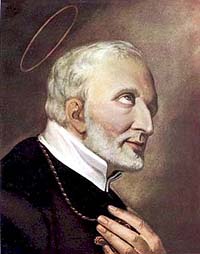
Tomorrow our small nation will welcome the Vicar of Christ, His Holiness Pope Benedict XVI on a state visit to the United Kingdom. The very notion of a state visit has resulted in a great deal of ire and fanatical moral panic. In some sense, I am delighted at this outcry. The Cross which the Holy Father proclaims presents a challenge to a country 'imprisoned in its wickedness' and forces it to truly consider the nature of man and its purpose in existing. Catholic Christianity is not soothing, consoling the sinner in his misery that he is free and authentically human. The Gospel does not appeal to those who seek a sprightly answer to particular difficulties or queries, but attacks the fundamental presumptions and axioms of the human person in order to clear away the accumulated filth gathered through the centuries and reveal the human person in his true dignity. Such a newly found dignity is that which only becomes actualised in union with Christ, the Head of the Church, 'the perfect form of the image of the Father', 'in Him we live, move and have our being'. Man only finds his uniqueness and purpose in relation to the God Who created him and called him to share in the Trinitarian Communion of love and life. Man cut off from this essential element of humanity reduces himself to nothingness and is only ascribed a value based upon a consensus of certain members of society. Instead of being seen as a creature willed into existence, his worth is solely dependent upon either his comeliness of appearance or economic productivity. What is truly wretched is not this state that man has descended to, but how he jealously guards such a pitiable position and laments that he is still held back from lowering himself further. 'Progress!' they clamour.
Before the human person can embrace the goodness and mercy of God, and live in Him as his nature requires for authenticity, he has to reject what he has always assumed and believed to be true. In our current climate, it is considered in accordance with right reason and humanity to murder the unborn without any qualms and to pervert the ends and purpose of sexuality or marriage all in the name of liberty. Yet, the Roman Pontiff will come with the blessing of the Most High and will point out He Who is our Way, our Purpose, our Liberty and our Freedom. This message will not make comfortable hearing, yet why should truth be rejected simply as you believe you will be 'inconvenienced'? We in Scotland have forsaken the Faith handed on to us so that we may wander off in pursuit of fulfilment, yet it is always better in the Father's house.
I really do hope that we will see the humility, love and humanity of Joseph Ratzinger on his visit to our wee country and will reject facile classifications and see Christ Who is our only hope.
Before the human person can embrace the goodness and mercy of God, and live in Him as his nature requires for authenticity, he has to reject what he has always assumed and believed to be true. In our current climate, it is considered in accordance with right reason and humanity to murder the unborn without any qualms and to pervert the ends and purpose of sexuality or marriage all in the name of liberty. Yet, the Roman Pontiff will come with the blessing of the Most High and will point out He Who is our Way, our Purpose, our Liberty and our Freedom. This message will not make comfortable hearing, yet why should truth be rejected simply as you believe you will be 'inconvenienced'? We in Scotland have forsaken the Faith handed on to us so that we may wander off in pursuit of fulfilment, yet it is always better in the Father's house.
I really do hope that we will see the humility, love and humanity of Joseph Ratzinger on his visit to our wee country and will reject facile classifications and see Christ Who is our only hope.








.png)
